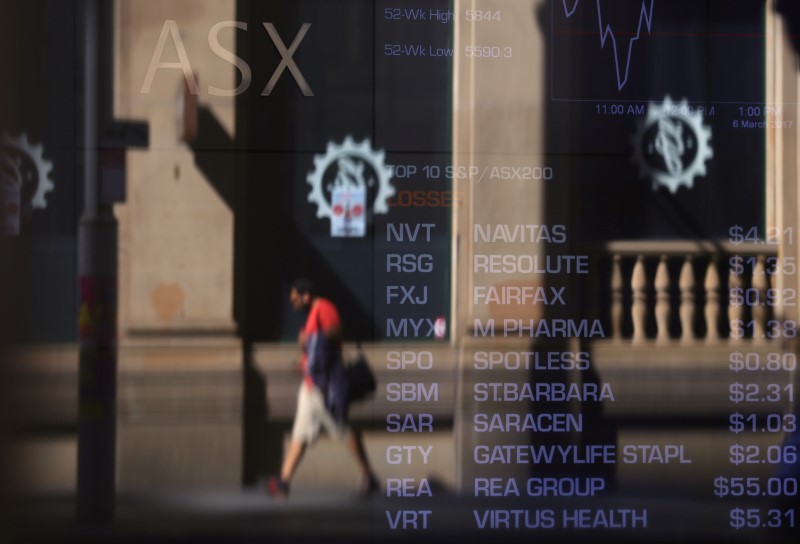Street Calls of the Week
ASX Futures are pointing to a strong slide in early trading today, with the ASX likely to fall 83 points or 1.2%, following tumbling US and European markets into a slide.
Escalating global tensions driven by the conflict in the Middle East and a raft of missed corporate earnings forecasts resulted in steep declines for US and EU markets overnight, each falling by at least 1%.
Tech and finance stocks led the fall, none more so than Tesla (NASDAQ:TSLA) and Netflix (NASDAQ:NFLX), which dropped 4.8% and 2.7% respectively ahead of their earnings reports, and Morgan Stanley (NYSE:NYSE:MS) tumbled 6.8% as profits fell due to a weak activity in investment banking.
The Dow Jones index declined by 333 points or 1%, the S&P 500 slid 1.3% and the Nasdaq index fell by 219 points or 1.6%.
European markets followed suit, with mining stocks leading losses at a 2.7% dip, following major steelmaker ArcelorMitta’s 3.9% drop as Bank of America (NYSE:BAC) downgraded the stock to "neutral" on waning demand.
The continent-wide FTSEurofirst 300 index declined by 1% and London’s UK FTSE 100 index dipped 1.1% after hotter-than-expected British consumer inflation data was released.
Annual consumer price inflation (CPI) remained stable at 6.7% in September, matching survey predictions.
US dollar climbs; commodities a mixed bag
Currencies weakened against the US dollar in both European and US trading sessions.
The Euro dropped from US$1.0593 to US$1.0522, closing near US$1.0535 in US trade. The Australian dollar similarly fell from US 63.92 cents to US 63.27 cents and settled near US 63.35 cents at the US close. The Japanese yen eased from 149.60 yen per US dollar to JPY149.95 and closed nearly at JPY149.90.
Global oil prices surged approximately 2% after Iran advocated for an oil embargo on Israel and a higher-than-expected draw in US crude storage.
The US Energy Information Administration reported a draw of 4.5 million barrels last week, significantly surpassing analysts' estimates of a 0.3-million-barrel drawdown.
Brent crude rose by US$1.60 or 1.8% to US$91.50 a barrel, and the US Nymex crude price increased by US$1.66 or 1.9% to US$88.32 a barrel.
Base metals saw a bump following the release of favourable Chinese economic growth data.
Copper futures edged up 0.2% while aluminium futures climbed 0.4%.
Gold futures also gained, rising by US$32.60 or 1.7% to US$1,968.30 an ounce, with spot gold trading close to US$1,949 an ounce at the US close. In contrast, iron ore futures slightly retreated, dipping US 30 cents or 0.3% to US$119.01 a tonne.
Looking ahead, market participants will be eyeing labour force reports from Australia and earnings releases from various global corporations, and Fed chair Jerome Powell will be speaking.
Trade tensions curb Chinese enthusiasm
“Trade tensions are back in focus following the US’s decision to restrict the sale of Nvidia’s products to China,” Capital.com senior market analyst Kyle Rodda said.
“The curbs target specific chips the company manufactures for the Chinese market and show how governments are weaponising private companies to achieve their strategic ends.
“Semiconductor stocks slid on the developments, with effective restrictions on the markets these companies sell into a handbrake on growth and future earnings.
“Nvidia shares are also lower on the news, albeit only relatively modestly.
“Given the enormous growth assumptions propping up the chip-maker's valuation, geopolitical risks may become a larger factor in deflating the stock's price from here.
“More broadly, the tit-for-tat escalation also reveals the risk of retaliation by China and the prospect of more sluggish trade and marginally greater price pressures that could emerge because of deglobalisation.”
On the small cap front
The S&P ASX Small Ordinaries gained 1.7% yesterday, handily outrunning the ASX’s more modest gains of 0.3%.
You can read more about the following throughout the day.
